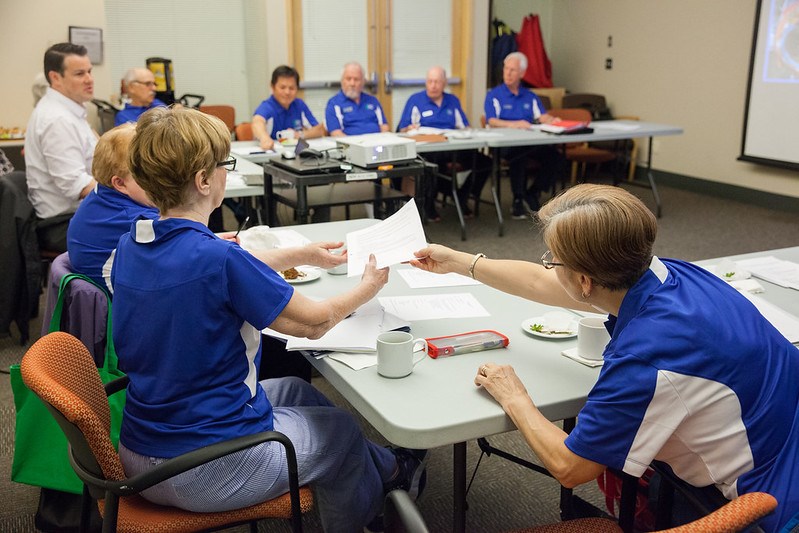Public consultation on major projects and municipal issues is going to look a bit different in Coquitlam as the COVID-19 pandemic progresses.
The days of packing an open house full of residents for discussions about a new development or a city initiative are over for the time being. But according to a survey commissioned by the city, residents still want to have their say when it comes to shaping their community.
“Everybody still wants to be involved and have their voice,” said Kathleen Vincent, Coquitlam’s manager of corporate communications. “We proposed some of the online tools and most of the respondents were in favour of that as an alternative.”
According to the survey results, 94% of residents agree the city should consult and inform the community on city issues even as the public health crisis continues.
Virtual meeting tools are the most popular method, with 74% of respondents saying they are comfortable using tools like Microsoft Teams or Zoom, while another 60% said they would be open to participating in online engagement sessions.
Most people prefer getting their information through emails, where they can take part in online questionnaires, and 30% would like to see virtual events, the survey found.
Vincent said that the city is learning from other municipalities and engagement experts who have been sharing what they have learned over the course of the pandemic.
However, there are some downsides that come with virtual consultations, noted a staff report.
Vincent said many people use online meeting applications during the work day, and there is a risk of screen fatigue. That means the city may have to get creative in how it engages online, she added.
“We will continue to work with our project teams to look at what alternatives we can do to use online that isn’t necessarily Zoom, or refined how we use Zoom so it is more engaging,” Vincent said.
But in-person engagement sessions will not become a thing of the past.
City staff are looking at ways of holding outdoor open houses, where planners and policy makers could bring diagrams of various project proposals and neighbourhood plans and meet with the public.
Still, technology will be helpful even in real life events, Vincent said.
For example dot posters, an engagement tool where a series of proposals are displayed on posters and participants put stickers on their preferred options, does not work when officials want to limit touch points.
However, Vincent said QR codes could have the same effect without the need for any physical contact.
“There is an opportunity to space information boards in a park and have them at a distance,” she said, adding there are “tools that allow them to be there in person and avoid touching things.”
consultation on major projects and municipal issues is going to look a bit different in Coquitlam as the COVID-19 pandemic progresses.
The days of packing an open house full of residents for discussions about a new development or a city initiative are over for the time being. But, according to a survey commissioned by the city, residents still want to have their say when it comes to shaping their community.
“Everybody still wants to be involved and have their voice,” said Kathleen Vincent, Coquitlam’s manager of corporate communications. “We proposed some of the online tools and most of the respondents were in favour of that as an alternative.”
According to the survey results, 94% of residents agree the city should consult and inform the community on city issues even as the public health crisis continues.
Virtual meeting tools are the most popular method, with 74% of respondents saying they are comfortable using tools like Microsoft Teams or Zoom, while another 60% said they would be open to participating in online engagement sessions.
Most people prefer getting their information through emails, where they can take part in online questionnaires, and 30% would like to see virtual events, the survey found.
Vincent said that the city is learning from other municipalities and engagement experts who have been sharing what they have learned over the course of the pandemic.
However, there are some downsides that come with virtual consultations, noted a staff report.
Vincent said many people use online meeting applications during the work day, and there is a risk of screen fatigue. That means the city may have to get creative in how it engages online, she added.
“We will continue to work with our project teams to look at what alternatives we can do to use online that isn’t necessarily Zoom, or refined how we use Zoom so it is more engaging,” Vincent said.
But in-person engagement sessions will not become a thing of the past.
City staff are looking at ways of holding outdoor open houses, where planners and policy makers could bring diagrams of various project proposals and neighbourhood plans and meet with the public.
Still, technology will be helpful even in real-life events, Vincent said.
For example, dot posters, an engagement tool where a series of proposals are displayed on posters and participants put stickers on their preferred options, does not work when officials want to limit touch points.
However, Vincent said QR codes could have the same effect without the need for any physical contact.
“There is an opportunity to space information boards in a park and have them at a distance,” she said, adding there are “tools that allow them to be there in person and avoid touching things."



